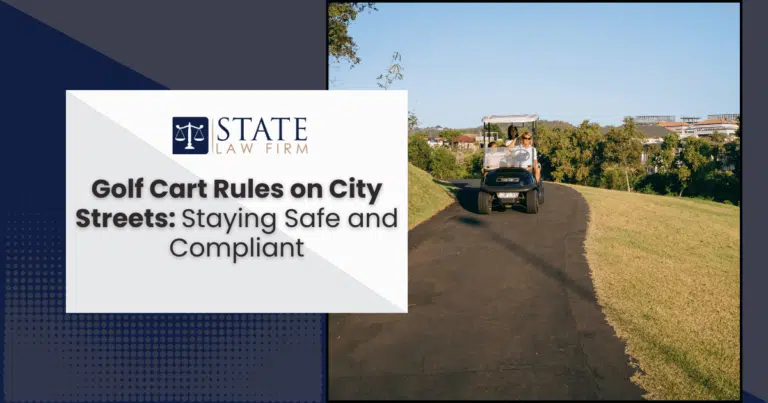Golf carts have become a popular mode of transportation in California, whether for zipping around neighborhoods, navigating golf courses, or even running errands in local communities. However, before you hit the road in a golf cart, it’s crucial to understand the legal and safety implications. While these vehicles offer convenience and a touch of leisure, they are subject to a unique set of regulations that differ from those governing traditional cars. In fact, California reports nearly 15,000 golf cart-related accidents annually, underscoring the importance of knowing and complying with state and local laws. (Source: National Safety Council)
In this guide, we’ll walk you through everything you need to know about golf cart regulations in California. From licensing and insurance requirements to navigating city-specific ordinances, we’ll provide the essential details to ensure you’re both informed and compliant. For those who face accidents or legal disputes involving golf carts, our boutique personal injury law firm is here to help. Based in Sherman Oaks, we pride ourselves on delivering personalized service and advocating for clients in complex cases. If you need expert legal advice, don’t hesitate to reach out to our premises liability lawyers in Sherman Oaks for guidance.
Let’s explore the rules, responsibilities, and resources that every golf cart operator in California should know.
Understanding the Basics: What Are Golf Cart Regulations?
Golf carts may look like small and simple vehicles, but California law has specific requirements for their use. According to the California DMV, golf carts are defined as motor vehicles designed to carry no more than two persons, including the driver, and must weigh less than 1,300 pounds unladen. They are also limited to a maximum speed of 15 miles per hour. (Source: California DMV)
To operate a golf cart legally on city streets in California:
- It must be driven in areas with speed limits of 25 mph or less.
- It does not require registration or a license plate unless modified to exceed standard specifications.
- Additional safety features like seat belts, headlights, and turn signals may be required for carts used on public roads.
Pro Tip: If you’re considering modifying your golf cart for street use, check your city’s specific regulations to avoid penalties. Modifications can turn your golf cart into a low-speed vehicle (LSV), subjecting it to stricter laws and registration requirements. Learn more about golf cart dimensions and specifications here.
Key Safety Guidelines for Operating Golf Carts in Urban Areas
Operating a golf cart in urban environments requires special attention to safety. Unlike traditional vehicles, golf carts lack many of the safety features found in standard cars, which increases the risk of accidents.
Here are some essential safety tips:
- Stay Visible: Equip your cart with reflectors and LED lights, especially if driving during dawn, dusk, or in low-light conditions.
- Use Hand Signals: If your cart lacks turn signals, practice clear hand gestures to communicate with other drivers and pedestrians.
- Observe Speed Limits: Always adhere to the 15 mph speed limit for golf carts and reduce speed on uneven terrain.
- Avoid Distractions: Don’t text, use your phone, or engage in activities that divert your attention while driving.
- Limit Passengers: Never exceed the cart’s passenger capacity. Overloading can affect the vehicle’s balance and braking capabilities.
Pro Tip: Check with your local municipality for rules about where golf carts are permitted to operate. Some areas have designated golf cart paths, while others allow carts on shared-use roads.
Do You Need a License? Understanding Licensing Requirements for Golf Cart Operators
A common question is whether a driver’s license is necessary to operate a golf cart. The answer depends on where and how you plan to use it.
- On Golf Courses: No license is required.
- On Private Property: Generally, no license is needed unless local ordinances state otherwise.
- On Public Roads: If the cart operates within communities or city streets, most California municipalities require drivers to hold a valid license, especially for individuals under 18.
California has set age and licensing requirements for public use to ensure safety for all road users. Pro Tip: Always carry a form of ID, even when using a cart recreationally. Rules can vary by state and city, so double-check local guidelines to avoid fines.
Insurance Considerations: Do You Need Insurance for Your Golf Cart?
Insurance for golf carts isn’t always mandatory, but it is highly recommended. Liability coverage can protect you if your cart causes injury or damage to another person or their property.
When Insurance Is Required:
- When driving on public roads.
- If your golf cart is modified into an LSV.
- If required by local ordinances for specific areas.
Types of Golf Cart Insurance:
- Liability Coverage: Protects against damages or injuries caused by the driver.
- Collision Coverage: Covers damages to your cart in an accident.
- Comprehensive Coverage: Protects against theft, vandalism, or weather-related damages.
Pro Tip: Contact your auto insurance provider to inquire about adding golf cart coverage to your policy. Bundling it with existing insurance may offer significant savings.
Navigating Local Ordinances: How to Find Specific Rules in Your City
While California has overarching laws for golf cart use, local municipalities often implement additional rules. Understanding these city-specific ordinances is crucial for compliance.
Steps to Find Local Regulations:
- Visit Your City’s Website: Many cities publish their municipal codes online, outlining rules for golf cart use.
- Contact Local Authorities: Reach out to your city hall or local police department for clarification.
- Use Online Resources: Websites like the California DMV and state transportation pages can provide additional insights.
Pro Tip: Keep an eye out for “golf cart-friendly” communities, which often have marked paths and reduced restrictions. These neighborhoods prioritize golf cart use, making them safer for operators.
The Importance of Compliance: Consequences of Ignoring Golf Cart Laws
Failing to follow California’s golf cart laws can result in fines, impoundment, and increased liability if an accident occurs. Additionally, operating an unregistered or uninsured golf cart on public roads can lead to criminal charges in severe cases.
Common Consequences:
- Fines: Violations can range from $50 to $500 depending on the infraction.
- Legal Liability: Without proper insurance, you could be held personally responsible for damages or injuries caused by your cart.
- Impoundment: Local authorities may impound your golf cart for non-compliance.
Pro Tip: Stay ahead of potential issues by scheduling a consultation with a legal professional. If you’re unsure whether your cart complies with the law, we can help clarify the requirements and protect your rights.
By following these guidelines, you can enjoy the convenience of golf cart transportation while staying safe and compliant. If you have been involved in a golf cart-related accident or have questions about your legal rights, our boutique personal injury law firm in Sherman Oaks is here to help. Reach out to us for personalized assistance and advocacy tailored to your needs.


